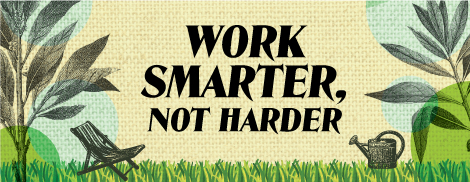 With a little planning, you won’t have to spend your spring and summer busting your hump in the yard! Follow our easy tips for working smarter, not harder when it comes to lawn care and outdoor watering.
With a little planning, you won’t have to spend your spring and summer busting your hump in the yard! Follow our easy tips for working smarter, not harder when it comes to lawn care and outdoor watering.
Test your soil before using fertilizer. Don’t spend time and money on fertilizer your lawn probably doesn’t need. The Hampton Roads region is naturally high in many nutrients including phosphorous. A soil test will recommend exactly what kind of soil amendments or fertilizer your lawn needs. Adding too much fertilizer could actually harm your grass and it will definitely harm local waterways.
Seed bare spots to reduce erosion. Bare spots in your yard not only ruin your curb appeal, they are also a sign that something is wrong with your lawn. When you have bare spots, you also continuously lose your soil. You may want to research other ground cover options which are more suitable for your yard if you’re having a hard time keeping your turf grass from dying off. Soil testing may also reveal a nutrient deficiency that can be addressed through soil amendments, compost or fertilizer.
Leave grass clippings on the lawn. When grass clippings are left on the lawn, they naturally break down and return nitrogen to your soil. It’s like free fertilizer and you won’t have to figure out how to get rid of those grass clippings anymore. Grass clippings that fall onto driveways or sidewalks should be swept back onto your lawn to help prevent them from ending up in storm drains.
Reduce your lawn with bigger flower beds. Less lawn means less mowing – especially in your front yard where grassy lawns are seldom used. Trees, shrubs and hardy perennials all help reduce stormwater runoff with the extra benefit of beautifying your property and increasing your home value. Convert sections of grass to flower beds for a low maintenance yard.
Plant native plants that are suited to our climate. Native plants just make sense. They thrive on the type of soil in your yard and the amount of rain in our climate. When you go for native plants, you reduce your need to fertilize and water – saving both time and money and helping conserve water resources.
Use compost and mulch in flower beds to help retain water. There are so many great things about compost and mulch. Compost recycles kitchen and yard waste into a rich source of nutrients for your lawn and garden without the harmful side effects of chemical fertilizers. Both compost and mulch protect soil and help it retain water so you’ll have to pull out the water hose much less often.
Install a rain barrel and adjust sprinklers away from paved areas. Rain barrels are a simple way to get a free source of water for outdoor uses like watering plants and washing the car. They also help lower the volume of stormwater produced by your property. And if you are watering with a traditional sprinkler – please do not water your sidewalks and driveways! Adjust sprinklers so water only goes where it is needed. We promise your driveway won’t miss it a bit!
Water in the morning when there’s less evaporation. During the hot, dry summer, watering your lawn and garden can account for nearly 75 percent of your water bill. If you do need to water, make the most of it. Watering when the sun is low in the sky, winds are calm and temperatures are cool can minimize evaporation by up to 30 percent. The best time to water is early in the morning. Watering in the evening helps conserve water, but might promote fungus growth.